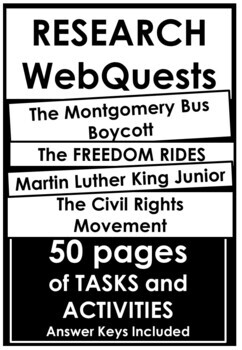NO Prep - Civil Rights Movement - Bundle - Research / WebQuests
- Zip
- Internet Activities
- Webquests
Products in this Bundle (4)
Description
FOUR Resources in this bundle:
- The Montgomery Bus Boycott - 15 pages (excluding answer keys)
- The Freedom Rides - 13 pages (excluding answer keys)
- Martin Luther king - 12 pages (excluding answer keys)
- The Civil Rights Movement - 9 pages (excluding answer keys)
All the resources are setup like WEBQUESTS / Reserach Tasks.
ALL the tasks could be used in the following ways:
- Introduction Task
Use the research part of the task as an introduction task to the topic.
Students could then complete the essay afterwards.
- Independent Research Project / Webquest
Students could complete the task independently and submit as part of a research project with the essay.
- Homework
Set the task as part of normal homework on the topic.
- Subplan
Use the resource as a subplan.
See details of each resource below:
MONTGOMERY BUS BOYCOTT
This resource on the Montgomery Bus Boycott covers the following topics and contains activities on:
Plessy v. Ferguson (1896)
Jim Crow Laws
The Women’s Political Council
- Mary Fair Burks
- Jo Ann Robinson
- E.D Nixon
Rosa Parks
- Claudette Colvin
The Montgomery Improvement Association
- Martin Luther King Junior
Brown vs Education Board of Topeka (1954)
Browder v. Gayle (1956)
- Fred Gray
Think about the following … ( agree/disagree/own opinion)
What if ... (essay activity)
Key Ideas and Concepts (Own definitions)
Who were they? (Crossword)
FREEDOM RIDES
This resource is set up like a Webquest / Research Project. It deals with the FREEDOM RIDES and guides student learning on:
- the rationale behind the first FREEDOM RIDE,
- the first FREEDOM RIDE,
- the challenges and opposition the FREEDOM RIDERS faced,
- the route taken,
- the NASHVILLE Student Freedom Ride, and
- the people behind the FIRST FREEDOM RIDE.
In the final task, students write an essay based on their research and information they collected.
MARTIN LUTHER KING JUNIOR
This WEBQUEST takes a look at some of the main events of Rev. Dr. Martin Luther King Jr.'s life and his role in the Civil Rights Movement. It starts off with a KWL chart, 30 questions follow, with the last one asking students to add additional events they think are important. The final task is an essay.
The CIVIL RIGHTS MOVEMENT - A TIMELINE
This resource provides students with a broad overview of the history of the Civil Rights Movement. They independently research major events in the organisation's history by investigating key dates and events plotted on a timeline. For each event, there is a clue and/or a picture which the students use to guide them on their research.
The following key dates / events are included:
- July 26, 1948 – Executive Order 9981
- May 17, 1954 - Brown v Board of Education of Topeka
- August 28, 1955 - EMMETT TILL
- December 1, 1955
- December 5, 1955
- June 5, 1956 - Montgomery Federal Court – 14th Amendment
- September 3, 1957 - Little Rock Nine
- Civil Rights Act of 1957
- February 1, 1960 - Greensboro
- November 14, 1960 - Ruby Bridges
- May 4, 1961 - Freedom Rides
- Spring 1963 – The Birmingham Campaign.
- August 28, 1963 - The March on Washington
- July 2, 1964 - Civil Rights Act 1964
- 1964 - Mississippi Freedom Summer Project
- February 21, 1965 – Assassination of Malcom X
- March 7, 1965 - Selma – Montgomery March
- February 21, 1965 – Assassination of Malcom X
- March 7, 1965 - Selma – Montgomery March
- August 6, 1965 - Voting Rights Act of 1965
- April 4, 1968 - Martin Luther King Jr / James Earl Ray
- April 11, 1968 – The Fair Housing Act
At the start there is a KWL chart and the last activity requires students to add any other events/dates which they found to be important during their research to be important.
I am no US history teacher. I use these tasks and activities in my EFL/ESL classes but I am sure they will be of use in the history classroom.
I have read through the resources many times, but if you see or come across any mistakes, please let me know so that I can fix it. I would love feedback on these resources, please - THANKS IN ADVANCE.
TERMS OF USE: Please note that only the purchaser is permitted to make reproductions of these pages for the use in his/her classroom. Other types of reproductions are prohibited as there are restrictions on pictures and fonts. Please make sure to take a look at the ToU pages.
Pictures used are from www.unsplashed.com and permission for use was obtained.
Pictures used are also from www.pixabay.com.
Credits and links in the ToU.


